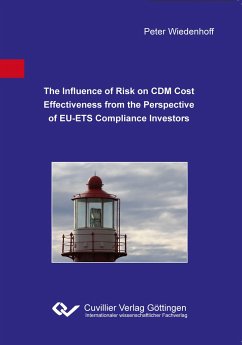
The Influence of Institutional Investors on Corporate Management and Corporate Governance in Germany
A Multi Perspective Analysis

PAYBACK Punkte
0 °P sammeln!
Diploma Thesis from the year 2008 in the subject Business economics - Law, grade: 1,3, Technical University of Chemnitz, language: English, abstract: Corporate management and corporate governance are becoming more and more crucial in today's successful economies. With the increasing relevance of capital markets this subjectcomes more into the focus of the public. Particularly, the fast growing importance of institutional investors is a key factor which helps to explain the changing attitude of managerstowards shareholders and corporate governance. In conjunction with the German capital market,...
Diploma Thesis from the year 2008 in the subject Business economics - Law, grade: 1,3, Technical University of Chemnitz, language: English, abstract: Corporate management and corporate governance are becoming more and more crucial in today's successful economies. With the increasing relevance of capital markets this subjectcomes more into the focus of the public. Particularly, the fast growing importance of institutional investors is a key factor which helps to explain the changing attitude of managerstowards shareholders and corporate governance. In conjunction with the German capital market, a wide variety of mismanagement inGerman public limited companies has revealed shortfalls of German top-management and corporate control in the last decade. This development was of fundamental importance for the development of the German Corporate Governance Code. Hence, the basic underlyingof corporate governance can be attributed to a conflict between the management of a listed corporation and its owners. More precisely, this conflict arises because the management does not adequately comprise the interests of shareholders. In Germany, assets under management of professional investors have increased at 92 percent from 1990 to 2001.1 In addition, a growing administration of private savings by professional fund managers as well as the intensified exercise of influence by institutionalinvestors on corporate governance and corporate management respectively corporate strategy is observable. Similarly, a growing importance of institutional investors could be observedin the United Kingdom as well as in the United States. Within academic literature, the issue of activism by institutional investors in Germany is analyzed little, so far. Furthermore, there are only a few surveys on the outcome of the influence by institutional investors on corporate management. Therefore, this thesis aims to answer the following questions:1. How was the development of shareholder activism inGermany and how can it be characterized and explained?2. Is shareholder activism a superior tool in relation to the market of corporate control to solve the principal-agent problem?3. What do institutional investors demand from German corporations and in particular from corporate management?4. Which options do institutional investors have to influence corporate management?5. How are these options for activism covered by the German Corporate GovernanceCode and the German legal framework?6. What is the optimum corporate governance from an institutional investor's angle?7. What is the empirical outcome?













